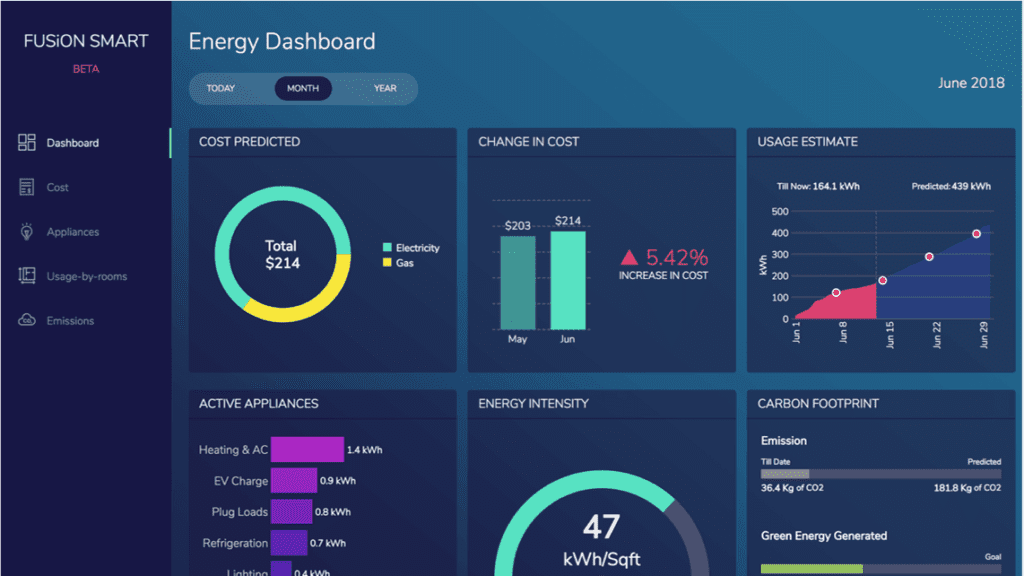How To Tell If Solar Panels Are Working? To determine if solar panels are working, you can: 1. Test the voltage using a multimeter. 2. Monitor if kilowatt-hours are increasing. Additionally, check the inverter, inspect the solar meter, and review your electric bill. It’s important to regularly assess the performance of your solar panels to ensure they are generating electricity efficiently and effectively. Solar panels are becoming increasingly popular as a sustainable energy source for homes and businesses.

However, it is essential to know whether your solar panels are functioning optimally. As a responsible solar panel owner, you need to be able to tell if your solar panels are working to ensure that you are making the most of this renewable energy resource. We will discuss some methods for determining if your solar panels are working properly, including testing the voltage, monitoring kilowatt-hours, checking the inverter, inspecting the solar meter, and reviewing your electric bill. By following these steps, you can ascertain the performance of your solar panels and address any issues promptly.
Understanding Solar Panel Functionality
What Are Solar Panels?
Photovoltaic (PV) panels, or solar panels, capture sunlight and turn it into usable power. They are made up of individual solar cells that are connected together to form a panel. These panels are typically installed on rooftops or in open areas with direct sun exposure.
How Do Solar Panels Generate Electricity?
The photovoltaic effect is what solar panels use to turn light into energy. Each solar cell in a panel contains layers of semiconducting materials, usually silicon. When sunlight hits the solar cells, it excites the electrons in the material, causing them to move and create an electric current. How To Tell If Solar Panels Are WorkingThis current is then captured and converted into usable electricity for homes or businesses.
Why Is It Important To Ensure Solar Panels Are Working?
Ensuring that solar panels are working properly is crucial for maximizing their efficiency and getting the most out of your solar system.
- Energy production: Solar panels are designed to generate electricity from the sun’s energy. If they are not working, you may not be producing as much electricity as you should, leading to a decrease in energy savings and potential financial losses.
- System monitoring: Monitoring the performance of your solar panels helps you identify any issues or malfunctions early on. This allows you to take necessary steps to rectify the problem and ensure that your system continues to generate electricity efficiently.
- Warranty and maintenance: Most solar panel manufacturers offer warranties for their products. Regularly checking the performance of your panels ensures that any potential warranty claims can be addressed in a timely manner. How To Tell If Solar Panels Are Working Additionally, proper maintenance and upkeep of solar panels help extend their lifespan and ensure optimal functionality.
- Environmental impact: Solar panels provide a clean and renewable source of energy. By ensuring that they are working correctly, you are maximizing their environmental benefits and reducing your reliance on fossil fuels, thus contributing to a greener and more sustainable future.
Regular monitoring and maintenance of solar panels are essential for their long-term performance and efficiency. By keeping a check on their functionality, you can reap the full benefits of solar energy and contribute to a more sustainable future.
Visual Indicators
When it comes to assessing the performance of your solar panels, visual indicators can provide valuable insights. Checking for visible damages or defects, examining panel connections and wiring, and assessing the performance of other solar components are crucial steps in determining whether your solar panels are working optimally. Let’s explore each of these visual indicators in detail:
Checking For Visible Damages Or Defects
Inspecting your solar panels for any visible damages or defects is an important first step. Look for cracks, chips, or any physical damage on the surface of the panels. Additionally, check for discoloration or warping, as these may indicate underlying issues. If you notice any visible damages or defects, it is necessary to address them promptly to ensure your panels are functioning properly.
Examining Panel Connections And Wiring
The connections and wiring of your solar panels play a crucial role in their performance. Visually inspect the cables, connectors, and junction boxes for any signs of wear, corrosion, or loose connections. Ensure that the wiring is neatly organized and securely connected. Any loose connections or damaged wiring can contribute to reduced efficiency and performance. If you spot any issues, it is advisable to contact a professional to rectify them.
Assessing The Performance Of Other Solar Components
While the solar panels themselves are integral to the system, other components such as inverters, batteries, and monitoring systems also play a vital role in ensuring optimal performance. Check the functionality of your inverters by reviewing their display screens for any error messages or malfunctions. Additionally, monitor the performance of your batteries and verify that they are charging and discharging as expected. If you have a monitoring system, check for any abnormalities in the data, such as significantly reduced energy production. Any issues with these components can affect the overall performance of your solar panels, so it’s essential to address them promptly.

Credit: www.fusioncharts.com
Monitoring Energy Output
How To Read Your Solar Meter
One of the ways to monitor the energy output of your solar panels is by reading your solar meter. Most solar systems come with a physical meter or an app that allows you to track the solar production. Here’s how you can read your solar meter:
- Locate your solar meter. It is usually installed near your main electrical panel.
- Observe the display on the meter. It will show important information such as kilowatt-hours (kWh) generated by your solar panels.
- Take note of the current kWh reading. How To Tell If Solar Panels Are Working This reading represents the total energy produced by your solar panels.
- To determine the energy production, subtract the previous reading from the current reading. The difference between the two readings will give you the amount of energy generated since the last reading.
- Regularly check the meter readings to ensure that the kWh is increasing over time. If the readings are consistently increasing, it indicates that your solar panels are working properly.
By understanding how to read your solar meter, you can easily keep track of your solar panel’s energy production and ensure that they are functioning optimally to generate electricity for your home.
Understanding Energy Production Patterns
Monitoring your solar panel’s energy production patterns is essential to assess their performance. By understanding these patterns, you can detect any potential issues or changes in energy generation.
- Regularly compare the energy production from different periods, such as daily, weekly, or monthly.
- Pay attention to How To Tell If Solar Panels Are Working throughout the day. Solar panels tend to generate the most electricity during peak sunlight hours.
- Consider external factors that can affect energy production, such as weather conditions, shading, or obstructions near the panels.
By analyzing the energy production patterns, you can identify any abnormalities or trends and take appropriate measures to resolve them, maximizing the efficiency of your solar panels.
Analyzing Solar Monitoring Data
Monitoring data from your solar system provides valuable insights into its performance. To effectively analyze this data, follow these steps:
- Collect and organize the monitoring data, which may include energy production, system efficiency, and any error codes or alerts.
- Compare the data with the expected or desired performance of your solar panels. This can help identify any discrepancies or underper formance.
- Look for any patterns or trends in the data that may indicate issues or potential improvements.
- If you notice any significant deviations from the expected performance, consider consulting a professional solar technician for further investigation.
Regularly analyzing your solar monitoring data allows you to stay proactive in maintaining and optimizing the performance of your solar panels, ensuring they continue to generate clean and renewable energy efficiently.

Credit: suncityenergy.com
Using A Multimeter To Test Solar Panels
One of the most effective ways to ensure that your solar panels are working efficiently is by using a multimeter. A multimeter is a versatile tool that can accurately measure the voltage, current, and resistance of electrical circuits. In this section, we will provide you with step-by-step instructions on how to test your solar panels using a multimeter and how to interpret the voltage readings.
Introduction To Multimeters
A multimeter is an essential tool for anyone interested in solar panels and their performance. It allows you to measure the electric potential difference, also known as voltage, across your solar panels. By measuring the voltage, you can determine if your solar panels are generating the expected amount of electricity.
Step-by-step Instructions For Testing Solar Panels With A Multimeter
- Set your multimeter to the DC voltage setting. This is important as solar panels produce direct current (DC) electricity.
- Plug the multimeter’s positive (red) probe into the solar panel’s positive terminal and the negative (black) probe into the panel’s negative terminal. Ensure a proper connection.
- Read the voltage displayed on the multimeter. This reading will indicate the voltage produced by the solar panel.
- If you have multiple solar panels wired together, repeat the process for each panel individually to ensure accurate readings.
Interpreting Voltage Readings
Once you have obtained voltage readings from your solar panels, it is essential to interpret the results properly.
- If the voltage reading is significantly lower than the rated voltage of the solar panel, it may indicate a problem with the panel or its connections.
- If the voltage reading is zero, it suggests that the solar panel is not receiving any sunlight or has a fault in the wiring.
- On the other hand, if the voltage reading is close to the rated voltage, it indicates that the solar panel is operating effectively and generating power.
By following these step-by-step instructions and understanding how to interpret voltage readings, you can easily assess if your solar panels are working optimally.How To Tell If Solar Panels Are Working. Regularly testing your solar panels will help you identify any potential issues and ensure the maximum efficiency of your renewable energy system.

Credit: solarpower.guide
Professional Inspection And Maintenance
Regular inspection and maintenance of your solar panels are critical to ensure their optimal performance and longevity. It’s essential to hire a professional who specializes in solar panel systems to conduct these inspections and perform any necessary maintenance. This professional expertise will help identify any issues, troubleshoot common problems, and guarantee that your solar panels are working efficiently.
The Importance Of Regular Maintenance
Regular maintenance plays a crucial role in keeping your solar panels in peak condition. It involves inspecting the entire system, including the panels, wiring, inverters, and mounting structure. This examination allows professionals to identify any signs of damage caused by weather elements, wear and tear, or other external factors.
During the maintenance process, the professionals will also clean the solar panels to remove any dirt, dust, or debris accumulation that can hinder their performance. Regular cleaning ensures maximum sunlight absorption and energy conversion, resulting in better energy output.
Hiring A Professional For An Inspection
When it comes to inspecting your solar panels, it’s highly recommended to hire a professional technician who specializes in solar panel systems. These professionals are well-versed in the intricacies of solar panel maintenance and troubleshooting common issues.
A professional inspection will include a comprehensive assessment of the entire system, including checking for any loose connections, corrosion, or damaged components. They will also verify the functionality of the inverters, ensuring they are converting the direct current (DC) from the panels to alternating current (AC) for use in your home.
Troubleshooting Common Issues
Even with regular maintenance, solar panels can still encounter issues. Hiring a professional for an inspection allows for efficient troubleshooting of common problems. These professionals have the expertise and equipment to diagnose and resolve issues quickly, keeping your solar panel system running at its best. How To Tell If Solar Panels Are Working
Here are some common issues that professionals can troubleshoot:
- Inverter malfunctions: Professionals can determine if the inverter is working correctly and identify any faults that may prevent proper energy conversion.
- Wiring problems: They will examine the wiring for any loose connections, damage, or signs of wear that may lead to power loss.
- Shading issues: Professionals can identify any obstructions causing shading on your panels, such as overgrown trees or nearby buildings, that may reduce their performance.
- Monitoring system failures: If your solar panel system has a monitoring system, professionals can diagnose any issues that may be affecting its functionality.
Overall, hiring a professional for inspection and maintenance of your solar panels is imperative for ensuring their optimal performance and longevity. How To Tell If Solar Panels Are Working. These experts have the knowledge and tools to identify potential issues, troubleshoot problems, and keep your solar panels working efficiently, resulting in maximum energy savings for your home.

Credit: www.electronicshub.org
Frequently Asked Questions Of How To Tell If Solar Panels Are Working
How Do I Know If My Solar Panel Is Working?
To check if your solar panel is working, follow these steps: 1. Use a multimeter to test the voltage of the panel. 2. Ensure that the meter shows a positive reading. 3. Monitor the meter over time to see if the reading increases. 4. Check for a functioning inverter. 5. Keep an eye on your utility bill – if it decreases, your solar system is working. How To Tell If Solar Panels Are Working
How Do I Check My Solar Production?
To check your solar production, use the following methods: 1. Use a physical solar meter or an app provided with your solar system to track solar output. 2. Monitor the kilowatt-hours. If they are increasing, your solar system is performing. 3. How To Tell If Solar Panels Are Working
Check for any issues like inverter problems, malfunctioning solar meter, dirt, and dust that may affect solar panel efficiency. Source: Sunrun, Palmetto Solar
Why Are My Solar Panels Not Generating Electricity?
If your solar panels are not generating electricity, it could be due to inverter issues, a faulty solar meter, dirt or dust on the panels, or snail trails. Check for these problems to ensure proper functioning.
How Do I Know If My Solar Panel Is Charging My Battery?
To know if your solar panel is charging your battery, you can follow these steps: 1. Check the kilowatt-hours: If the kilowatt-hours are increasing, your solar system is performing. 2. Inspect the inverter: Ensure it is functioning correctly. 3. Read the solar meter: Monitor the power output.
4. Examine your electric bill: Look for any changes in energy consumption. 5. Contact your solar company for further assistance.
Conclusion
So there you have it, a comprehensive guide on how to tell if solar panels are working. By following these steps and monitoring your system regularly, you can ensure that your solar panels are generating the maximum amount of electricity.
Remember to check the weather, inspect your inverter, read your solar meter, examine your electric bill, and reach out to your solar company if you have any concerns. With a properly functioning solar panel system, you can enjoy the benefits of clean and renewable energy for years to come.

